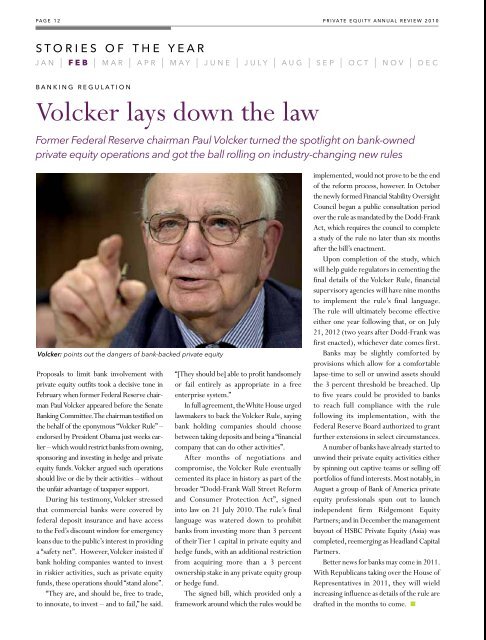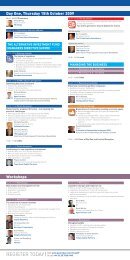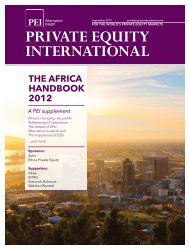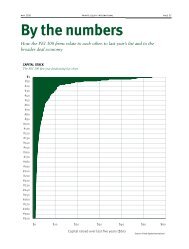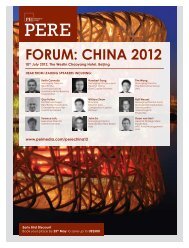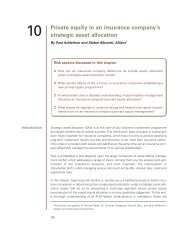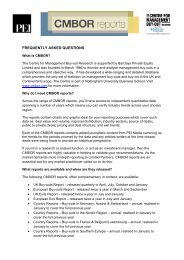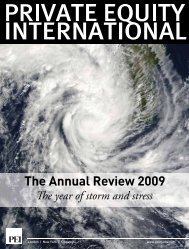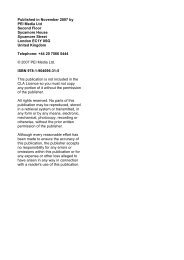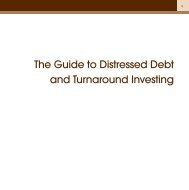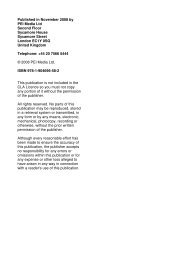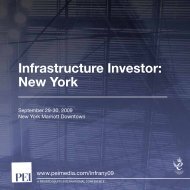THE ANNUAL REVIEW 2010 - PEI Media
THE ANNUAL REVIEW 2010 - PEI Media
THE ANNUAL REVIEW 2010 - PEI Media
You also want an ePaper? Increase the reach of your titles
YUMPU automatically turns print PDFs into web optimized ePapers that Google loves.
page 12 private equity annual review <strong>2010</strong><br />
s to r i e s o f t h e y e a r<br />
j a n | f e b | m a r | a p r | m a y | j u n e | j u ly | a u g | s e p | o c t | n o v | d e c<br />
b a n k i n g re g u l a t i o n<br />
Volcker lays down the law<br />
Former Federal Reserve chairman Paul Volcker turned the spotlight on bank-owned<br />
private equity operations and got the ball rolling on industry-changing new rules<br />
Volcker: points out the dangers of bank-backed private equity<br />
Proposals to limit bank involvement with<br />
private equity outfits took a decisive tone in<br />
February when former Federal Reserve chairman<br />
Paul Volcker appeared before the Senate<br />
Banking Committee. The chairman testified on<br />
the behalf of the eponymous “Volcker Rule” –<br />
endorsed by President Obama just weeks earlier<br />
– which would restrict banks from owning,<br />
sponsoring and investing in hedge and private<br />
equity funds. Volcker argued such operations<br />
should live or die by their activities – without<br />
the unfair advantage of taxpayer support.<br />
During his testimony, Volcker stressed<br />
that commercial banks were covered by<br />
federal deposit insurance and have access<br />
to the Fed’s discount window for emergency<br />
loans due to the public’s interest in providing<br />
a “safety net”. However, Volcker insisted if<br />
bank holding companies wanted to invest<br />
in riskier activities, such as private equity<br />
funds, these operations should “stand alone”.<br />
“They are, and should be, free to trade,<br />
to innovate, to invest – and to fail,” he said.<br />
“[They should be] able to profit handsomely<br />
or fail entirely as appropriate in a free<br />
enterprise system.”<br />
In full agreement, the White House urged<br />
lawmakers to back the Volcker Rule, saying<br />
bank holding companies should choose<br />
between taking deposits and being a “financial<br />
company that can do other activities”.<br />
After months of negotiations and<br />
compromise, the Volcker Rule eventually<br />
cemented its place in history as part of the<br />
broader “Dodd-Frank Wall Street Reform<br />
and Consumer Protection Act”, signed<br />
into law on 21 July <strong>2010</strong>. The rule’s final<br />
language was watered down to prohibit<br />
banks from investing more than 3 percent<br />
of their Tier 1 capital in private equity and<br />
hedge funds, with an additional restriction<br />
from acquiring more than a 3 percent<br />
ownership stake in any private equity group<br />
or hedge fund.<br />
The signed bill, which provided only a<br />
framework around which the rules would be<br />
implemented, would not prove to be the end<br />
of the reform process, however. In October<br />
the newly formed Financial Stability Oversight<br />
Council began a public consultation period<br />
over the rule as mandated by the Dodd-Frank<br />
Act, which requires the council to complete<br />
a study of the rule no later than six months<br />
after the bill’s enactment.<br />
Upon completion of the study, which<br />
will help guide regulators in cementing the<br />
final details of the Volcker Rule, financial<br />
supervisory agencies will have nine months<br />
to implement the rule’s final language.<br />
The rule will ultimately become effective<br />
either one year following that, or on July<br />
21, 2012 (two years after Dodd-Frank was<br />
first enacted), whichever date comes first.<br />
Banks may be slightly comforted by<br />
provisions which allow for a comfortable<br />
lapse-time to sell or unwind assets should<br />
the 3 percent threshold be breached. Up<br />
to five years could be provided to banks<br />
to reach full compliance with the rule<br />
following its implementation, with the<br />
Federal Reserve Board authorized to grant<br />
further extensions in select circumstances.<br />
A number of banks have already started to<br />
unwind their private equity activities either<br />
by spinning out captive teams or selling off<br />
portfolios of fund interests. Most notably, in<br />
August a group of Bank of America private<br />
equity professionals spun out to launch<br />
independent firm Ridgemont Equity<br />
Partners; and in December the management<br />
buyout of HSBC Private Equity (Asia) was<br />
completed, reemerging as Headland Capital<br />
Partners.<br />
Better news for banks may come in 2011.<br />
With Republicans taking over the House of<br />
Representatives in 2011, they will wield<br />
increasing influence as details of the rule are<br />
drafted in the months to come. ■


